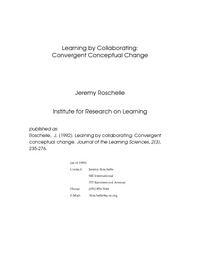Learning by collaboratingConvergent conceptual change
Erstpublikation in: The Journal of the Learning Sciences, 2(3), 235-276.
Publikationsdatum:
Zu finden in: CSCL (Seite 209 bis 242), 1996
|
 |
 Diese Seite wurde seit 3 Jahren inhaltlich nicht mehr aktualisiert.
Unter Umständen ist sie nicht mehr aktuell.
Diese Seite wurde seit 3 Jahren inhaltlich nicht mehr aktualisiert.
Unter Umständen ist sie nicht mehr aktuell.
 Zusammenfassungen
Zusammenfassungen
 The goal of this paper is to construct an integrated approach to collaboration and conceptual change. To this end, a case of conceptual change is analyzed from the point of view of conversational interaction. It is proposed that the crux of collaboration is the problem of convergence: How can two (or more) people construct shared meanings for conversations, concepts, and experiences? Collaboration is analyzed as a process that gradually can lead to convergence of meaning.
The goal of this paper is to construct an integrated approach to collaboration and conceptual change. To this end, a case of conceptual change is analyzed from the point of view of conversational interaction. It is proposed that the crux of collaboration is the problem of convergence: How can two (or more) people construct shared meanings for conversations, concepts, and experiences? Collaboration is analyzed as a process that gradually can lead to convergence of meaning. The epistemological basis of the framework of analysis is a relational, situated view of meaning: meanings are taken to be relations among situations and verbal or gestural actions. The central claim is that a process described by four primary features can account for students’ incremental achievement of convergent conceptual change. The process is characterized by: (a) the production of a deep-featured situation, in relation to (b) the interplay of physical metaphors, through the constructive use of (c) interactive cycles of conversational turn-taking, constrained by (d) the application of progressively higher standards of evidence for convergence.
 Dieser Text erwähnt ...
Dieser Text erwähnt ...
 Personen KB IB clear | John Seely Brown , Allan Collins , John Dewey , P. Duguid , Thomas S. Kuhn , Jean Lave , Donald A. Norman , Roy Pea , Jean Piaget , Lew Semjonowitsch Vygotsky , Etienne Wenger | ||||||||||||||||||||||||||||||||||||||||||||||||||||||||||||||||||||||||
 Begriffe KB IB clear | microworldmicroworld | ||||||||||||||||||||||||||||||||||||||||||||||||||||||||||||||||||||||||
 Bücher |
| ||||||||||||||||||||||||||||||||||||||||||||||||||||||||||||||||||||||||
 Texte |
|
 Zitationsgraph
Zitationsgraph
 Zitationsgraph (Beta-Test mit vis.js)
Zitationsgraph (Beta-Test mit vis.js)
 Zeitleiste
Zeitleiste
 19 Erwähnungen
19 Erwähnungen 
- Stolen Knowledge (John Seely Brown, P. Duguid)


- Collaborative Learning - Cognitive and Computational Approaches (Pierre Dillenbourg) (1999)
- Using An Unstructured Collaboration Tool to Support Peer Interaction in Large College Classes (David Craig, Saif ul-Haq, Sabir Khan, Craig Zimring, Colleen Kehoe, Jochen Rick, Mark Guzdial) (2000)

- Euro-CSCL - Proceedings of the first European Conference on Computer Supported Collaborative Learning (Pierre Dillenbourg, A. Eurelings, K. Hakkarainen) (2001)
- 67. Solving the Case Together - The Challenge of Net-based Interdisciplinary Collaboration (Fabian Hermann, Nikol Rummel, Hans Spada)

- 67. Solving the Case Together - The Challenge of Net-based Interdisciplinary Collaboration (Fabian Hermann, Nikol Rummel, Hans Spada)
- Beyond Adoption to Invention - Teacher-Created Collaborative Activities in Higher Education (Mark Guzdial, Jochen Rick, Colleen Kehoe) (2001)

- Computer Support for Collaborative Learning - Foundations for a CSCL Community - Proceedings of CSCL 2002 (Gerry Stahl) (2002)

- CSCL 2 - Carrying Forward the Conversation (Computers, Cognition, and Work) (Rogers Hall, Timothy D. Koschmann, Naomi Miyake) (2002)

- Unlocking the learning value of wireless mobile devices (Jeremy Roschelle) (2003)


- Scripts for computer-supported collaborative learning - Effects of social and epistemic collaboration scripts on collaborative knowledge construction (Armin Weinberger) (2003)


- What we know about CSCL and implementing it in higher education (Jan-Willem Strijbos, Paul A. Kirschner, Rob L. Martens) (2004)

- Building collaborative knowing - Elements of a Social Theory of CSCL (Gerry Stahl)
- Didaktik der Notebook-Universität - Mobiles Lernen auf dem Digitalen Campus (Michael Kerres, Marco Kalz, Jörg Stratmann, Claudia de Witt) (2004)

- Environmental Detectives - PDAs as a Window into a Virtual Simulated World (Eric Klopfer, Kurt Squire, Henry Jenkins) (2004)


- Environmental Detectives - PDAs as a Window into a Virtual Simulated World (Eric Klopfer, Kurt Squire, Henry Jenkins) (2004)
- Group Cognition - Computer Support for Collaborative Knowledge Building (Gerry Stahl) (2006)

- Scripting Computer-Supported Collaborative Learning (Frank Fischer, Ingo Kollar, Heinz Mandl, Jörg M. Haake) (2007)

- 2. Scripting collaborative learning processes - a cognitive perspective (Alison King)

- 2. Scripting collaborative learning processes - a cognitive perspective (Alison King)
- WikiSym 2007 (2007)
- Constructing Text - Wiki as a Toolkit for (Collaborative?) Learning (Andrea Forte, Amy Bruckman)

- Constructing Text - Wiki as a Toolkit for (Collaborative?) Learning (Andrea Forte, Amy Bruckman)
- Productive failure (Manu Kapur) (2008)


- Technology enhanced collaborative learning in projects - Dimensions of knowledge building: student’s activity, collaboration and communication (Michele Notari) (2012)

- 1. Project-based learning and knowledge building
- Digital Didactical Designs - Teaching and Learning in CrossActionSpaces (Isa Jahnke) (2015)

- Lernen mit Bildungstechnologien - Praxisorientiertes Handbuch zum intelligenten Umgang mit digitalen Medien (Helmut M. Niegemann, Armin Weinberger) (2019)
 Volltext dieses Dokuments
Volltext dieses Dokuments
 |  Learning by collaborating: Artikel als Volltext ( Learning by collaborating: Artikel als Volltext ( : :  , 111 kByte; , 111 kByte;  : :  2021-03-21) 2021-03-21) |
 Anderswo suchen
Anderswo suchen 
 Beat und dieser Text
Beat und dieser Text
Beat war Co-Leiter des ICT-Kompetenzzentrums TOP während er Dieser Text ins Biblionetz aufgenommen hat. Die bisher letzte Bearbeitung erfolgte während seiner Zeit am Institut für Medien und Schule. Beat besitzt kein physisches, aber ein digitales Exemplar. Eine digitale Version ist auf dem Internet verfügbar (s.o.).















 Biblionetz-History
Biblionetz-History